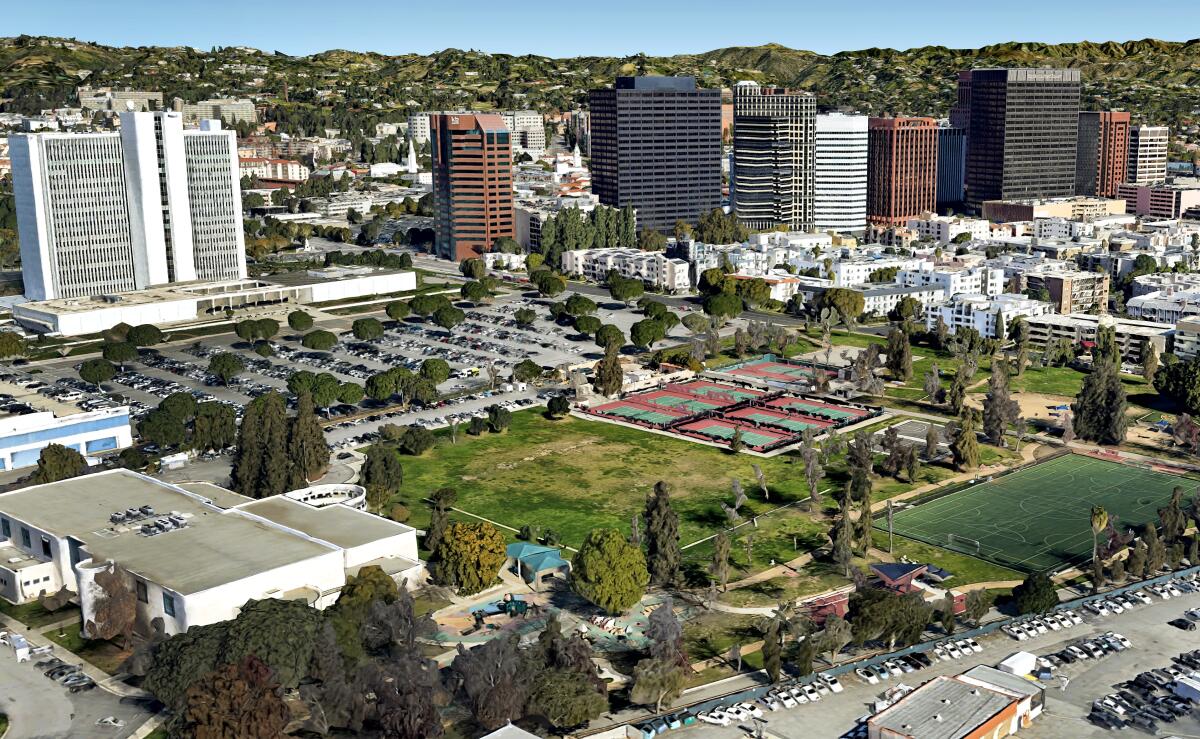Op-Ed: Even after he was gone, our son gave us the gift of persistence

- Share via
Why was it so hard to give the city of Los Angeles a brand new athletic field for children to play on?
My family had raised money to replace a decrepit field at Westwood Recreation Center and dedicate the new site to my 12-year-old son, Tommy, who went to sleep on Monday, April 16, 2018, and never woke up.
We poured our grieving hearts into it, along with thousands of children and adults across our city, by raising $1.2 million. The new field was designed to conserve water, reduce maintenance costs and avoid harmful chemicals, but most importantly it was conceived to promote free play and host multiple sports, including the most popular and diverse youth team sport in our city: soccer.
My son wanted to become a professional soccer player. For countless evenings, we watched him train with children who focused on how they played instead of their differing backgrounds and circumstances. I never could have anticipated how watching him play would inspire me in building his legacy.
After we hit our fundraising goals and had drafted a gift agreement, city officials privately asked me, “Do you have the community’s support?”
“Of course!” I responded.
Children in the neighborhood had sold lemonade and asked for donations in lieu of birthday presents. Colleagues hosted public fundraising events that sold thousands of tickets. Friends and family, joined by compassionate Angelenos who were complete strangers, made donations. Local businesses and schools supported it, along with nonprofit groups desperate for more places for kids to play.
“This has been a true community effort,” I assured them.
At the first city hearings, however, some neighbors living on one side of the park claimed that this recreation center was their backyard. They did not want more children, more whistles or more “outsiders.” Some local activists serving on neighborhood councils were quick to support them.
Detractors used various online platforms, including a well-known neighborhood site marketed to “bring communities together,” to criticize my family and spread falsehoods about the field, suggesting that the field would be caged, despite it having no lock or fence. That it would be privatized, despite knowing it would be fully managed by the city.
Critics did not trust our intentions. They were suspicious of local government. They were resistant to change. My husband and I are second-generation Angelenos living in the neighborhood, but some did not consider us, or “those people” who play soccer, part of their community.
It all felt so personal until I learned in public meetings that some of the opponents also resist bike lanes, transit stations — virtually anything that brings change.
My husband and I supported multiple design revisions to try to reach a consensus. Our efforts were only rejected by the opponents. We endured no less than 11 contentious community meetings spanning eight disheartening months. So much anger. So much divisiveness. All over an athletic field in a park dedicated to a 12-year-old who loved sports.
When the opponents’ reasons against the field kept changing, I reflected on all the times I had watched Tommy play soccer and began to apply what I had learned. Tired of being on defense, I changed my offense.
They raised their voices; I cut through the noise and asserted mine. They attacked with obscure city codes; I played simple and direct. They threatened with lawsuits and relied on bureaucracy to wear me out; I thought of Tommy and kept pressing forward. We didn’t reach our goal because we wielded the cleverest argument or legal maneuver, but because we were motivated by love and refused to give up. After nearly two years, our gift was finally approved by the Board of Recreation and Park Commissioners.
When Tommy’s Field opens in September, I will celebrate as my son did after scoring goals and winning matches. I will hug my teammates and cheer with our fans. I will also turn to our opponents and shake hands. For, after all, they are our neighbors. I hope to see their children and grandchildren enjoy Tommy’s Field, because it is theirs too.
Nikki Mark is founder and president of the TM23 Foundation, which supports youth initiatives.
More to Read
A cure for the common opinion
Get thought-provoking perspectives with our weekly newsletter.
You may occasionally receive promotional content from the Los Angeles Times.










